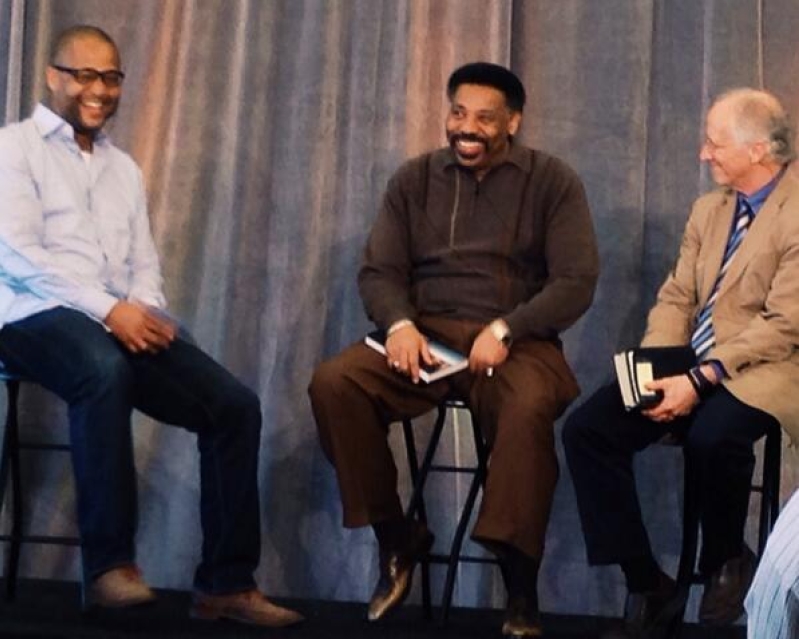
In a recent episode of "Ask Pastor John," Dr. John Piper expressed his gratitude for having been a part of a conference where he spoke alongside Dr. Tony Evans regarding Biblical perspectives on racial harmony within the church.
John Piper and Tony Evans are faithful expositors of God's word, having each served in the pulpit for decades. Though Piper knew Dr. Evans, he had never heard him preach in person. The two were invited as guest speakers at the Kainos event in Memphis, TN, - a conference encouraging pastors to grow the church "into the kind of multi-ethnic face that it will have in the kingdom," Piper says.
The retired pastor and author says he was enthralled by Dr. Evans' message at the conference. Evans, who was the first African American to get his doctorate at Dallas Theological Seminary, pastors Oak Cliff Bible Fellowship in Dallas, Texas. The two men delivered messages at the conference, and did a Q-and-A together - Piper joked that the event's host wanted the perspective of "Two old guys - I think he's 65, I'm 68 - so we've lived through a lot of racial stuff, and he wanted us to get into our stories," he says.
Piper came away from Dr. Evan's message more joyful and passionate for racial harmony within the church - "I just sat there enthralled at the way [Evans] used the Bible and spoke about the Bible in relationship to the whole issue of racial diversity and racial harmony," he says. Dr. Evans spoke from John chapter four, where Jesus approached the woman at the well - "[Evans] walked us through it, dropping nuggets of wisdom everywhere," Piper says.
Jesus didn't need to go through Samaria on His journey, Evans explained - in fact, Jews often thought themselves racially superior to the Samaritans and would not even venture to travel through the country. Christ did so because He wanted to demonstrate that the Gospel breaks down racial divides - or, as Evans put it, "Spiritual needs overrode cultural differences."
The Samaritan woman knew that Jesus was a Jew because of His physical appearance and the way that He spoke. "Implication: He didn't stop being a Jew in order to reach this 'half-breed' Samaritan," Piper says, summarizing Evans' message - "You don't have to stop being who you are in order to reach out across the [racial] line - but you don't let who you are get in the way of reaching, either."
Jesus asked the Samaritan woman for a drink, indicating that He was willing to touch a vessel that an unclean, non-Jew would bring Him. It was as if Christ said, "I'm not willing to touch your soul until I'm willing to drink from your cup," Evans said.
"Best of all, for me ... is the forceful way Dr. Evans put the Bible as the plumb line - not racial preferences as the plumb line - in all of our activity with regard to race and ethnicity. He said things like:
'Jesus is not calling white to be black or black to be white, but both to be Biblical' ... 'Biblical truth overrides cultural differences' ... 'Adjust your humanity to your faith, not your faith to your humanity' ... 'Black is beautiful only when it's Biblical. White is right only when it agrees with Holy Writ.'
That's just plain powerful and good," says Piper.
Dr. Evans also highlighted the passage in Galatians where the Apostle Paul scolds Peter for declining to eat with Gentiles. Paul was ferocious to assert God's desire to include people of every tribe, tongue, and language into His Kingdom. Evans then differentiated between the content of the Gospel and its scope - "He defined the content of the Gospel from 1 Corinthians 15 - [Jesus] died for us, He rose again, He must be believed on by faith alone, and He will give us eternal life - but the scope of the Gospel has these radical implications on whether you eat pork chops with Gentiles or not," Piper says.
"American racism would not have lasted so long if things had been right in the pulpit," Dr. Evans said in closing. His plea is for pastors to guard against cultural preferences and to pursue racial harmony within the church. Evans also released a related book, "#WeCanDoBetter: Healing the Racial Divide," in 2013.
Recordings of the Kainos conference may be made available online soon. "It was an honor to be a part of that event," says Piper.






